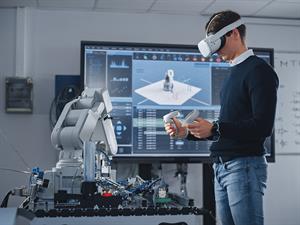PIRMĀ SEMESTRA NOSLĒGUMA TESTI
Robots are changing the world of work, medicine, and engineering. Discover how in the text below. Read the text and answer the questions.

The Rise of Robotics in Modern Engineering
Over the last few decades, robotics has become an essential part of the engineering world. From manufacturing to medicine, robots are transforming how tasks are performed, making them faster, more precise, and less dependent on human labour. In car factories, robotic arms assemble vehicles with a level of accuracy that humans cannot achieve. In hospitals, surgical robots assist doctors during delicate procedures, reducing the risk of human error.
Engineers play a critical role in designing, programming, and maintaining these robots. Many of them specialise in mechatronics – a field that combines mechanical, electronic, and computer engineering. As technology progresses, the demand for skilled robotics engineers increases. Their work doesn't end with moving machines; it also includes artificial intelligence (AI), which helps robots "think" and make choices based on data and learning algorithms.
Robots can also function in environments that are too dangerous for humans, such as deep-sea exploration or handling hazardous chemicals. They never get tired, don’t need breaks, and can work around the clock. However, not everyone is excited about their growing role. Some fear that robots will replace human workers, especially in industries like manufacturing and delivery, where automation is increasing rapidly.
Others argue that robots allow humans to focus on more meaningful work by taking over repetitive or physically demanding jobs. Supporters believe that with proper education and planning, societies can adapt to the changes and benefit from increased efficiency. The debate continues, but one thing is clear: robotics will shape not only the future of engineering but also the structure of the modern workplace.
Over the last few decades, robotics has become an essential part of the engineering world. From manufacturing to medicine, robots are transforming how tasks are performed, making them faster, more precise, and less dependent on human labour. In car factories, robotic arms assemble vehicles with a level of accuracy that humans cannot achieve. In hospitals, surgical robots assist doctors during delicate procedures, reducing the risk of human error.
Engineers play a critical role in designing, programming, and maintaining these robots. Many of them specialise in mechatronics – a field that combines mechanical, electronic, and computer engineering. As technology progresses, the demand for skilled robotics engineers increases. Their work doesn't end with moving machines; it also includes artificial intelligence (AI), which helps robots "think" and make choices based on data and learning algorithms.
Robots can also function in environments that are too dangerous for humans, such as deep-sea exploration or handling hazardous chemicals. They never get tired, don’t need breaks, and can work around the clock. However, not everyone is excited about their growing role. Some fear that robots will replace human workers, especially in industries like manufacturing and delivery, where automation is increasing rapidly.
Others argue that robots allow humans to focus on more meaningful work by taking over repetitive or physically demanding jobs. Supporters believe that with proper education and planning, societies can adapt to the changes and benefit from increased efficiency. The debate continues, but one thing is clear: robotics will shape not only the future of engineering but also the structure of the modern workplace.
1. What is the main idea of the text?
2. What can we understand about AI in robotics?
3. What does the phrase “the debate continues” tell us?
Lai iesniegtu atbildi un redzētu rezultātus, Tev nepieciešams autorizēties. Lūdzu, ielogojies savā profilā vai reģistrējies portālā!